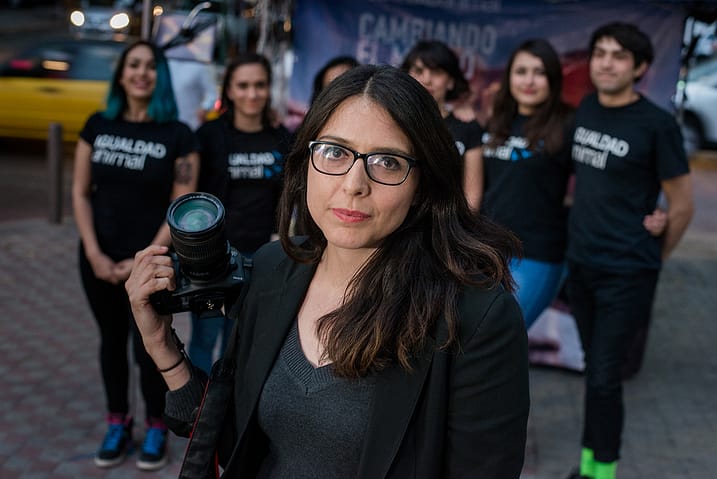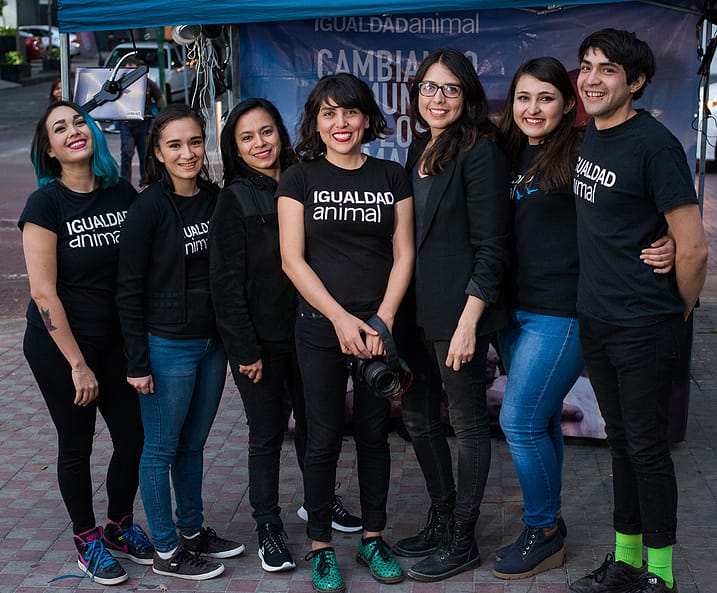“I deeply admire women who have done investigations”

Dulce Ramírez. All photos by Jo-Anne McArthur.
The first time that I meet Dulce Ramírez, I compliment her on her name – Dulce means ‘sweet’ in Spanish. “I am the opposite,” she says resolutely.
Those who know her agree. A colleague described her as “Persistent and tenaciously persuasive.” She’s also undeniably brave and focused. All valuable qualities when you are leading an animal rights organization in Mexico, a country where culture and national identity are so firmly rooted in food. In Mexico, food is about family, history and culture – and it is dominated by meat and cheese.
For Ramírez, it all started 13 years ago when she found a kitten on the patio behind her house. By caring for this kitten, “I began to understand the emotional world of animals, their needs, and their intelligence,” she explains. “I began to search for information and question more and more the relationship of subjugation we impose on other animals.” The more she learnt, the more it became clear to her that she wanted to advocate for animals.
Fast forward to June 2011, when the Spanish government arrested 12 animal rights activists linked to Igualdad Animal (Animal Equality) in Spain, labeling them ‘eco-terrorists’. Hearing this news, Ramírez contacted the founder and president of Igualdad Animal, Sharon Núñez, to express solidarity with the activists. The following year, the Mexico chapter of Igualdad Animal was founded, with Ramírez at the helm.
“The first thing we did was to show how Mexican industrial farming works.”
In the six years since, Igualdad Animal Mexico has achieved big things. Their first campaign brought animal groups in the state of Jalisco together to successfully end the use of animals in circuses. The organization has developed educational programs, petitioned for legislative changes, and conducted corporate outreach, encouraging companies to adopt policies that benefit animals, such as offering more plant-based options.

For the last two years, the organization has focused on improving the lives of farmed animals. As is the case in most countries, Mexico has virtually no legal protections for farmed animals. But while in some other regions the conversation about farm animal welfare is already well-established in the public discourse, that isn’t the case in Mexico. Given the victories coming for farm animals worldwide and the number of farmed raised and killed in Mexico each year, Ramírez believes this makes Mexico a prime target for bold campaigns and big changes. “For that reason, the first thing we did was to show how Mexican industrial farming works.”
At the foundation of this is investigative work, which Ramírez says is without doubt the most powerful ingredient for creating change. It is these investigations that, by documenting the lives of animals in factory farms, bring focus and strategy to the animal rights movement, she says. Without this footage, animal groups would struggle to develop hard-hitting public campaigns and educational resources telling the true stories of animals in animal use industries.
“I deeply admire women who have done investigations.”
Ramírez is one of only a few female investigators in the country. The work carries huge risks to personal safety, as well as the emotional toll of witnessing the intense suffering of animals.
“The challenge is always when, at the end of the day, you arrive home and the images come back into your head, you have the smell impregnated on your clothes and body, and it all takes you back.”
What inspires her to do this difficult work? “I deeply admire women who have done investigations, who take pictures of the most terrible situations and who transform it into struggle and activism to change the lives of the animals,” she says.
Igualdad Animal Mexico isn’t done setting precedents for the country. New investigations are planned and the group’s corporate campaigns continue. Their current legislative push — ending the use of cages for laying hens — is in full swing. They also plan to launch LoveVeg, a public education platform focused on changing consumer habits, in Mexico.
Leading the way, and with so many hearts and minds to change, Ramírez knows she is exactly where she needs to be.
Learn more and support Animal Equality.
Photographs by Jo-Anne McArthur. Interview and text by Anna Mackiewicz.




